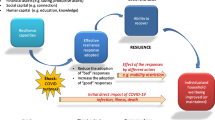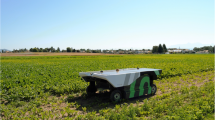Abstract
The agro-food domain in Europe is characterized by the appearance of recurrent unwanted surprises. These events, although causing obvious physical consequences, in essence depart from the expectations of the society. We argue that this unstable situation is best understood as an identity crisis of agriculture rather than as a contingent crisis of a specific economic sector. Thus the present agro-food crisis is in fact a crisis of identity. This is clearly reflected by the cohabitation within the agro-food policy domain of different, often contradictory, policy discourses, namely: free tradism, multifunctionality, and agroecology. All of them try to impose their particular visions. All of them struggle to issue the policy measures they conceive as appropriate.
Similar content being viewed by others
Notes
The distinction was made by Ulf Hedetoft (personal communication, March 25, 2003). However, we added a fourth approach to the threefold original version.
For an overview of how the term of discourse has been used in policy analysis, see Bacchi (2000).
The Russian agronomist Basil Bensin (1938) described agroecology as the “basic science of soil conservation.” According to him, agroecology seeks to undertake agricultural practices based on the environment and the particular farm culture of the given region. He traced back the term agroecology back to 1928 in the Czechoslovak Botanical Society.
The most relevant have been in the 1920s, the biodynamic agriculture of Steiner; in the 1940s, the natural agriculture of Fukuoka and the organic agriculture of Howard; and in the 1970s, the permaculture of Mollison and the biological agriculture of Claude Aubert.
This principle argues that since most of the attributes of genetically engineered food are similar to those of non-genetically engineered counterparts, it is the case that genetically modified food is substantially equivalent to its non-genetically counterpart, as regards the features that are relevant to consumers.
References
Altieri, M. A. (1998). Agroecology. The science of sustainable agriculture. UK: Westview Press.
Bacchi, C. (2000). Policy as discourse: What does it mean? Where does it get us? Discourse, 21, 45–57.
Barry, J., & Proops, J. (1999). Seeking sustainability discourses with Q methodology. Ecological Economics, 28, 337–345.
Bensin, B. (1938). Agroecology as a basic science of soil conservation. Soil Conservation, 152, 138–141.
Benton, T. (1989). Marxism and natural limits. New Left Review, 178, 51–86.
Bluhdorn, I. (1997). A theory of post-ecologist politics. Environmental Politics, 6, 125–147.
Buttel, F. (1996). Environmental and resource sociology. Rural Sociology, 61, 56–75.
Carson, R. (1962). Silent spring. Boston: Houghton Mifflin Co.
Countryside Agency. (2004). A review of urban and rural definitions: Project report. Cheltenham: Countryside Agency.
Dryzek, J. S. (1997). The politics of the earth. Environmental discourses. Oxford: Oxford University Press.
Dunlap, R., & Catton, W. (1994). Struggling with human exemptionalism. The American Sociologist, 25, 5–30.
ECRD, European Conference on Rural Development. (1996). Rural Europe—future perspectives. Cork, 7–9 November.
Eder, K. (1996). The social construction of nature. London: Sage.
Elliott, N. (1991). “To further free trade principles”: Origins of the economist. The Freeman, 41, 1–3.
Evernden, N. (1993). The social creation of nature. New Haven: Yale University Press.
Faber, D., & O’Connor, J. (1989). The struggle for nature: Environmental crises and the crisis of environmentalism in the United States. Capitalism, Nature, Socialism, 1, 12–39.
Financial Times. (2007). Indonesia blames WHO for bird flu deal. By John Aglionby and Andrew Jack, 7 February.
Fischler, F. (1998). Future of the European agricultural policy. Speech at the University of Wageningen. Wageningen, The Netherlands, 16 April.
Foucault, M. (1978). Gubernamentalidad (Julia Varela, Trans.). (1991) Espacios de Poder, 6, 9–26.
Frouws, J. (1998). The contested redefinition of the countryside. Sociologia Ruralis, 38, 54–68.
Glen Modison, M. (1997). «Potatoes made of oil»: Eugene and Howard Odum and the origins and limits of American agroecology. Environment and History, 3, 209–238.
Goodman, D. (1999). Agro-food studies in the “Age of Ecology”. Sociologia Ruralis, 39, 17–38.
Guzmán Casado, G., González de Molina, M., & Sevilla Guzmán, E. (2000). Introducción a la agroecología como desarrollo rural sostenible. Madrid: Ediciones Mundi-Prensa.
Hajer, M. A. (1995). The politics of environmental discourse. Oxford: Oxford University Press.
Halfacree, K. H. (1995). Talking about rurality. Journal of Rural Studies, 11, 1–20.
Hannigan, J. (1995). Environmental sociology. London: Routledge.
Human Development Report. (2003). Millennium development goals. New York: UNDP.
Jaworski, A., & Coupland, N. (1999). The discourse reader. London: Routledge.
Johnstone, B. (2002). Discourse analysis. Oxford: Blackwell.
Latour, B. (2004). Politics of nature (C. Porter 1999, Trans.). London: Harvard University Press.
Litfin, K. T. (1994). Ozone discourses. New York: Columbia University Press.
Macnaghten, P., & Urry, J. (1998). Contested natures. London: Sage.
Marsden, T. (1999). Rural futures: The consumption countryside and its regulation. Sociologia Ruralis, 39, 501–520.
Marsden, T. (2000). Food matters and the matter of food. Sociologia Ruralis, 40, 20–29.
Martínez-Alier, J. (2002). The environmentalism of the poor. United Kingdom: Edward Elgar.
Mitchell, S. (2000). Setting a slow table. The New Rules, 6, 18–21.
Murdoch, J. (1998). The spaces of actor-network theory. Geoforum, 29, 357–374.
Murphy, R. (2002). The internalisation of autonomous nature into society. The Sociological Review, 50, 313–333.
Norgaard, R. B. (1994). Development betrayed. Great Britain: Routledge.
O’Connor, J. (1994). Is sustainable capitalism possible? In M. O’Connor (Ed.), Is capitalism sustainable? (pp. 152–175). New York: Guilford Press.
Odum, H. T. (1967). Energetics of world food production. In President’s science advisory committee report (Ed.), The world food problem (Vol. III, pp. 55–94). Washington, DC: The White House.
PB, R. S. (2002). The state of the UK’s birds 2002. United Kingdom: Royal Society for the Protection of Birds.
Pearce, D. W., & Turner, R. K. (1990). Economics of natural resources and the environment. Great Britain: Harvester.
Pimentel, D., Hurd, L. E., Bellotti, A. C., Forster, M. J., Oka, I. N., Scholes, O. D., et al. (1973). Food production and the energy crisis. Science, 182, 443–449.
Proops, J. (2001). The (non-) economics of the nuclear fuel cycle: An historical and discourse analysis. Ecological Economics, 39, 13–19.
Richardson, T. (2000). Discourses of rurality in EU spatial policy. Sociologia Ruralis, 40, 54–71.
Schneider, S. H. (1998). Imaginable surprise in global change science. Journal of Risk Research, 1, 165–185.
United Nations. (1992). United Nations conference on environment and development. Agenda 21. Rio de Janeiro, June.
van Dijk, T. A. (Ed.). (1985). Handbook of discourse analysis. New York: Academic Press.
van Ploeg, D. W., & Long, A. (Eds.). (1994). Born from within. Practice and perspectives of endogenous rural development. The Netherlands: Van Gorcum.
Wetherell, M., Taylor, S., & Yates, S. (2001). Discourse theory and practice. London: Sage.
Wickman, K. (2001). A new agenda for european agriculture. Stockholm: Timbro.
World Health Organization. (2005). Handbook for journalists: Influenza pandemic. Switzerland: WHO.
World Health Organization. (2007). Cumulative number of confirmed human cases of avian influenza A/(H5N1) reported to WHO. Switzerland: WHO.
Worldwatch Institute. (1997). State of the world. New York: W.W. Norton & Company.
Author information
Authors and Affiliations
Corresponding author
Rights and permissions
About this article
Cite this article
López-i-Gelats, F., David Tàbara, J. A Cultural Journey to the Agro-Food Crisis: Policy Discourses in the EU. J Agric Environ Ethics 23, 331–344 (2010). https://doi.org/10.1007/s10806-009-9214-1
Accepted:
Published:
Issue Date:
DOI: https://doi.org/10.1007/s10806-009-9214-1




